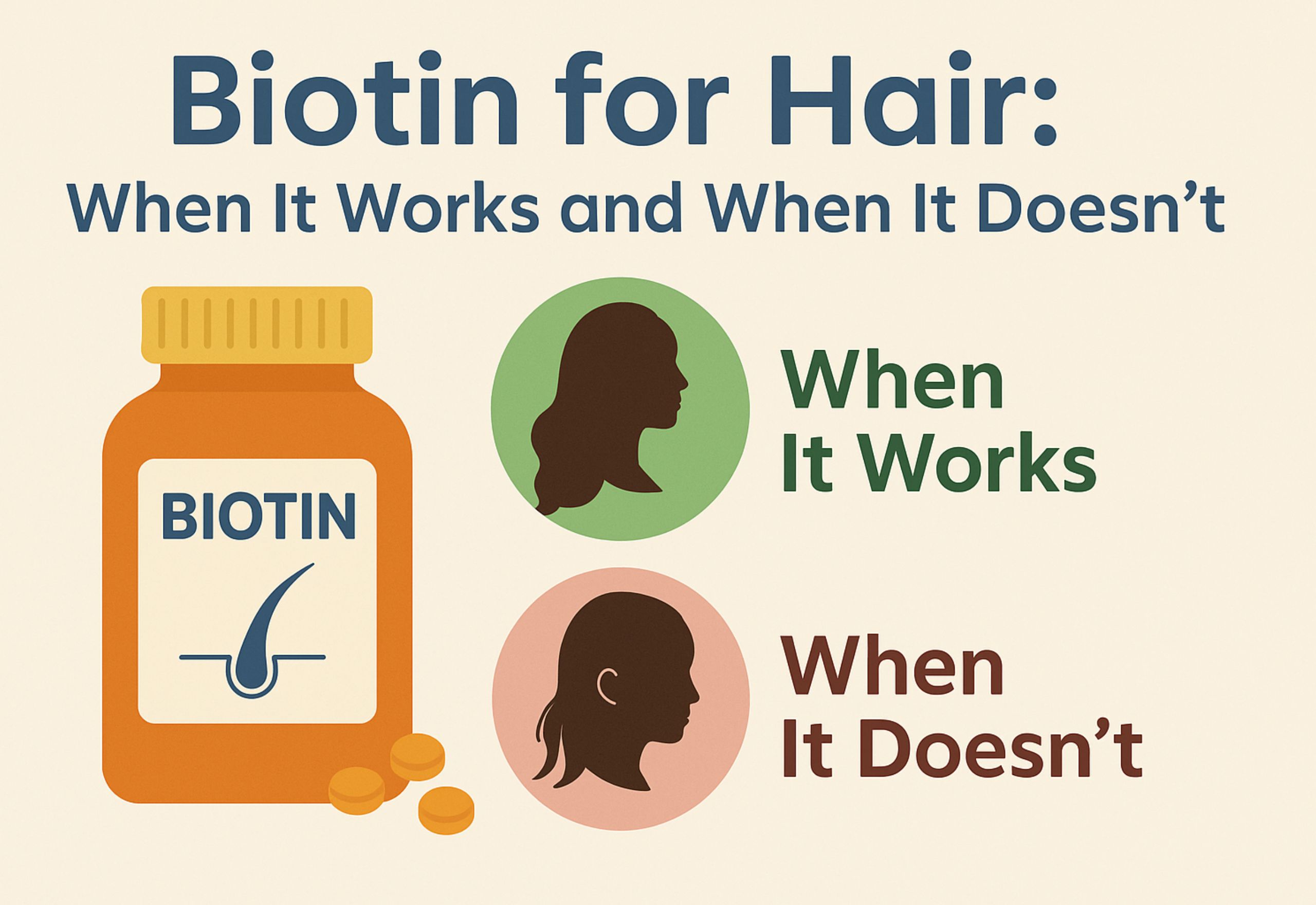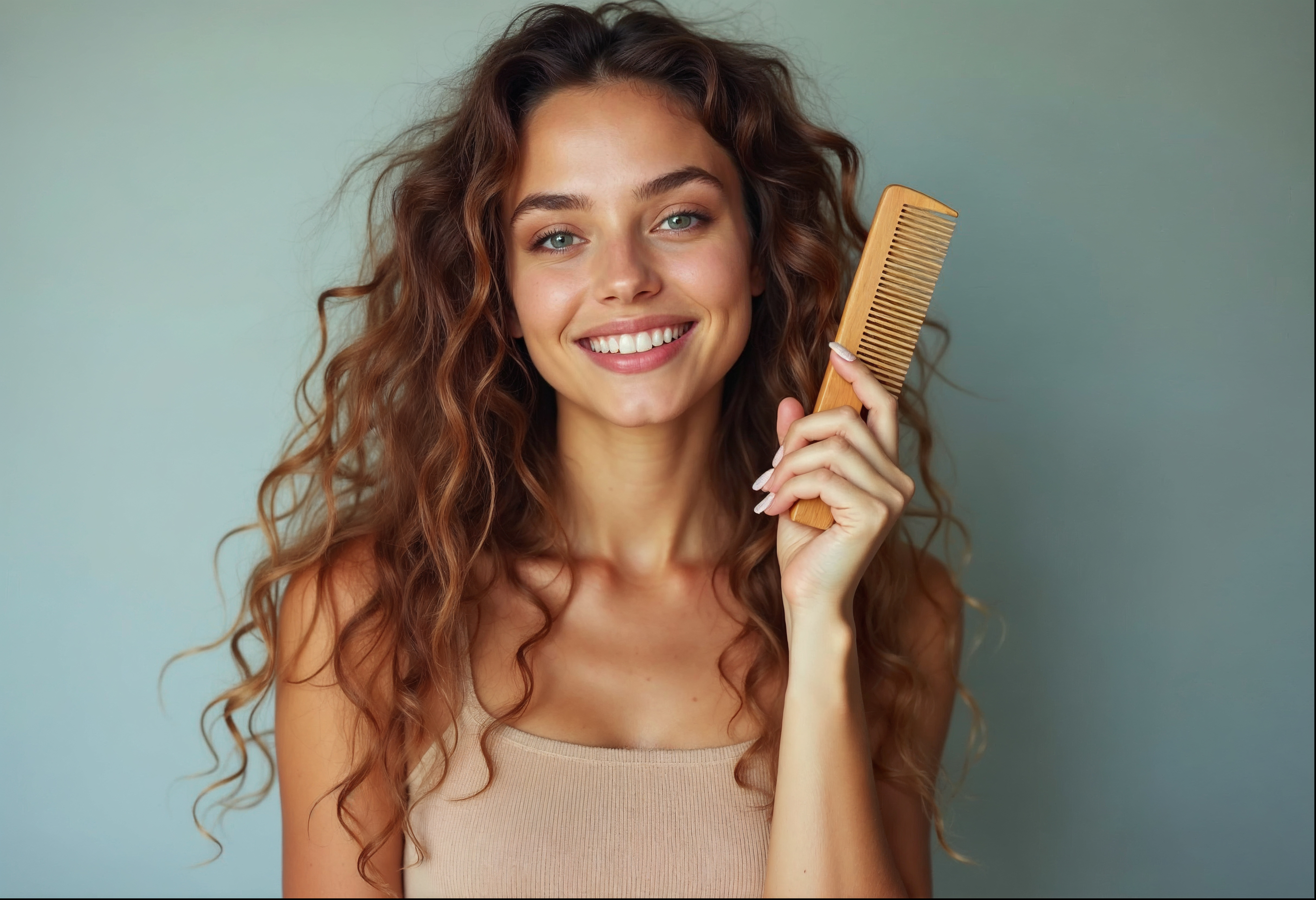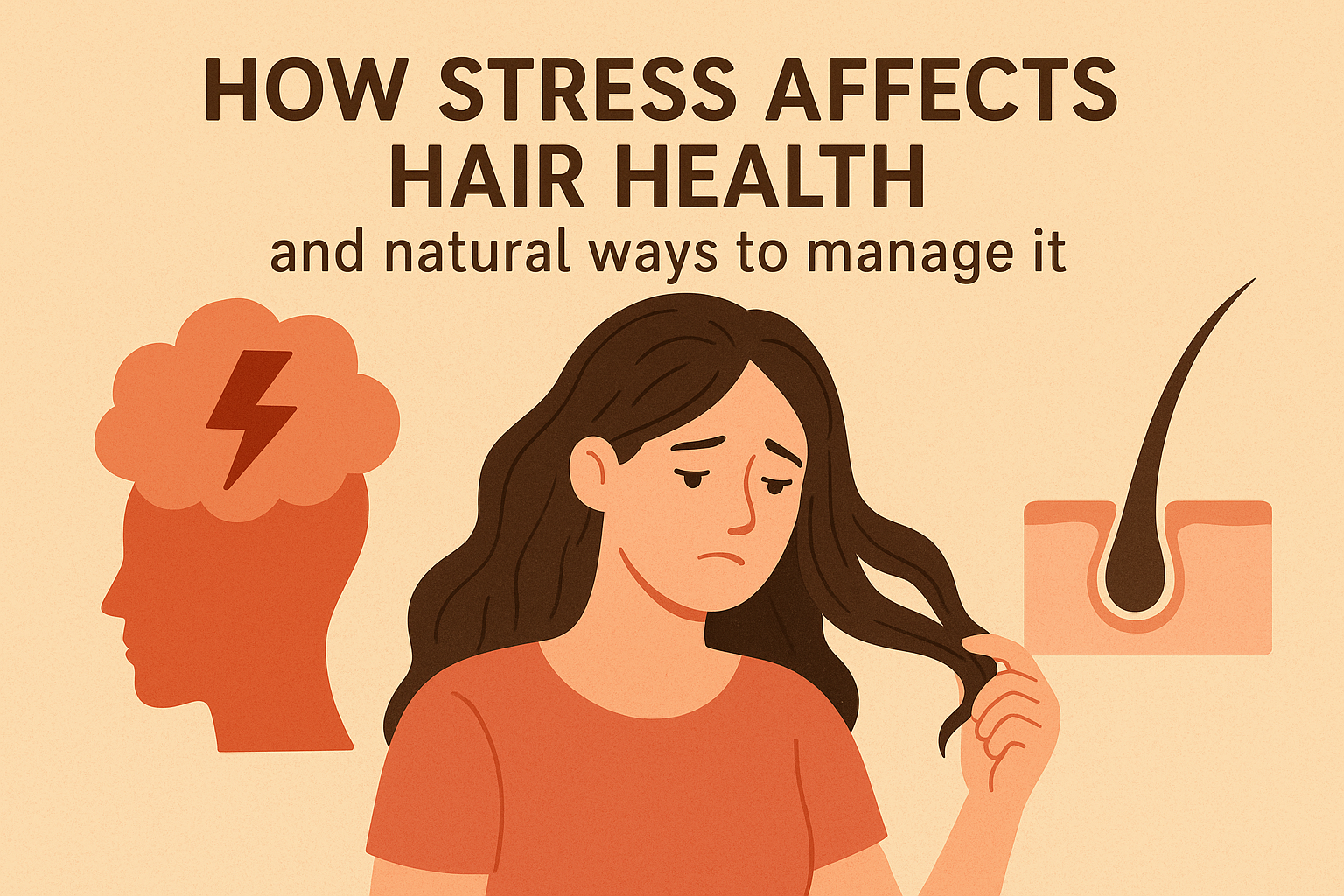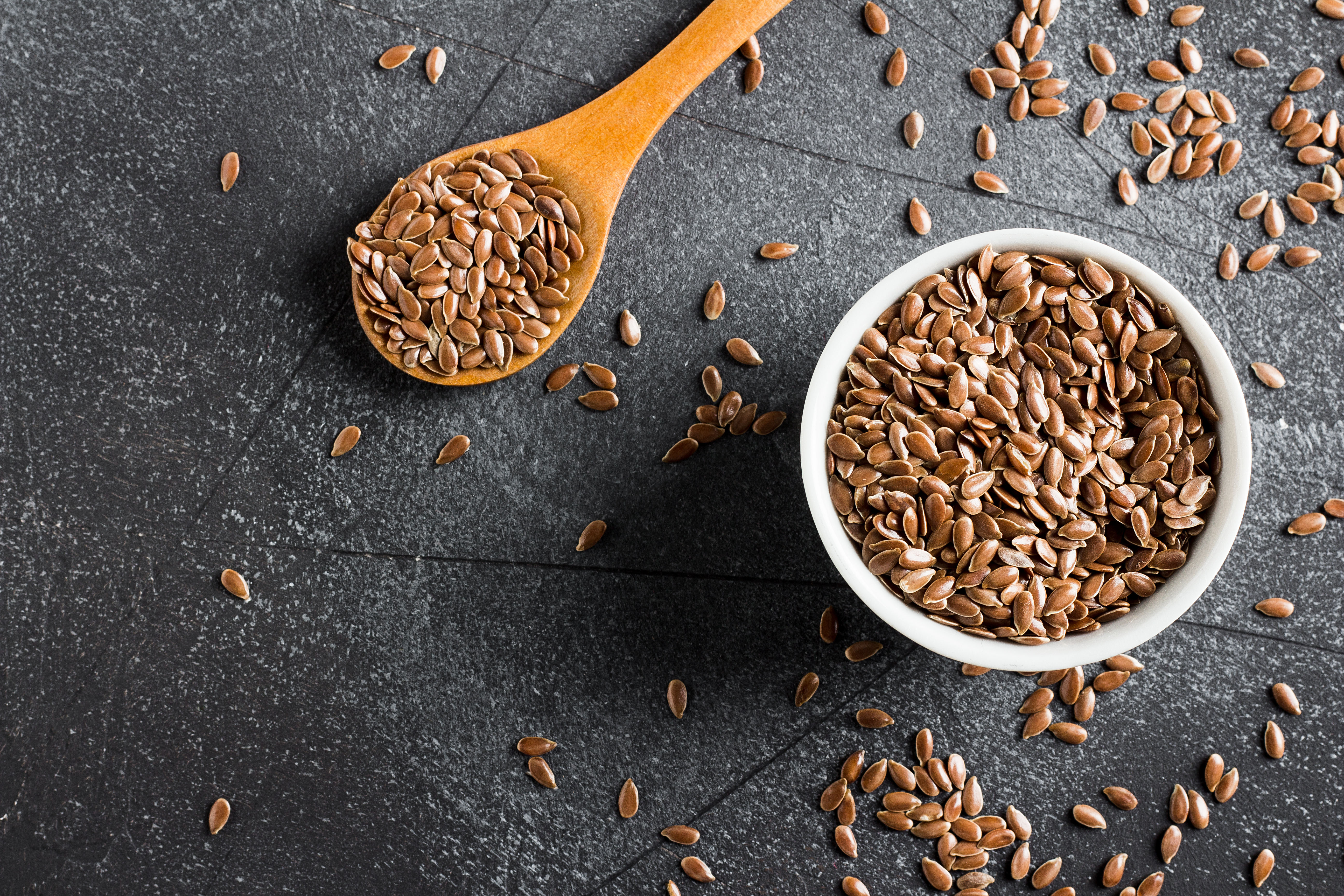Does shedding hair in the shower, thinning along your part, or hair that just doesn’t grow sound familiar? In times like these, there’s always the tempting supplement that everyone seems to recommend: biotin. Whether in capsules, gummies, shampoos, or plastered all over your Instagram feed, it’s everywhere.
The reality of Biotin benefits for hair, though, is a little more nuanced than you think. While some people notice that their hair seems thicker and healthier, others may see little change. The real question is: Does biotin help with hair loss? And if so, how long does it take for biotin to work?
Knowing where biotin does make a difference, and where it doesn’t, can save you time and sharpen your expectations.
Also Read: Best Vitamins and Minerals for Stronger, Thicker Hair
What is Biotin and What Does it Have to do with Hair Health?
Biotin, or Vitamin B7, is a water-soluble B-vitamin that our body utilizes for energy metabolism and also to grow healthy cells. In beauty and hair terminology, Biotin can be connected to beauty because of the association of biotin with keratinization, helping produce the structural protein in hair, skin, and nails.
When biotin is at the physiological level, keratinization is also constant, leading to a stronger hair shaft and healthier scalp. A lack of biotin can lead to hair that is brittle, slow-growing, and even thinning or shedding.
How biotin is related to hair health:
1: Increases keratin: supports hair structure at an internal level
2: Increases structural integrity: reduces breakage and splits
3: Increases scalp health: indirectly supports growth environments
4: A deficiency leads to shedding, especially noticeable during rapid shifts
Quick facts about biotin:
1: Also called Vitamin B7 or Vitamin H
2: Water-soluble means that the body doesn’t store it; we need it repeatedly.
3: Commonly found in whole eggs, almonds, walnut halves, sunflower seeds, brushable sweet potatoes, all leafy greens, and salmon.
4: Deficiency signs include hair loss, brittle nails, dry skin, and fatigue.
Biotin Benefits for Hair – What the Science Says
The most talked about Biotin benefits for hair, most often referring to getting stronger, thicker hair, can happen if the conditions are right. Biotin plays a role in the formation of keratin, the protein that makes up hair, so it can help give back (or restore) strength and shine when we need it most.
Where biotin can help:
1: Strengthens fragile strands: less breaking = longer hair over the longer haul
2: Improves thickness: can be very noticeable, especially if hair thinning has been associated with low biotin levels
3: Restoring healthy texture: keratin support can help restore the smoothness and shine
4: Recovering lost hair after hair shedding: as in postpartum hair loss, or hair loss due to illness
5: Recover from brittle hair: in cases of hair breakage/dryness brought on by biotin deficiency-related conditions
But let’s get real. If you’re wondering, Does biotin help with hair loss?, it depends on why you are losing hair.
1: Yes, if hair loss is a result of biotin deficiency
2: No, if the cause is genetic, hormonal,/or of a medical condition unrelated to nutrition.
And, if you’re wondering, how long does it take for biotin to work?, If a person sees benefits, the vast majority will have some healthier growth within 3-6 months of regular intake.
Also Read: How Onion Juice Helps Regrow Hair: Myth or Fact?
Does Biotin Help with Hair Loss? The Answer
When hair starts to thin or shed more than normal, it is natural to look for solutions. One of the questions that many people are curious about is, Does biotin help with hair loss? But the answer is not always a simple yes or no answer; it largely depends on what is causing the issue.
When biotin could help:
1: Thinning hair is related directly to biotin deficiency caused by a poor diet, a medication, or a gastrointestinal problem.
2: Post-partum shedding occurs when nutrients are depleted, following pregnancy.
3: Temporary shedding due to extreme dieting or illness.
When it won’t make a huge difference:
1: Genetic hair loss, male or female pattern baldness.
2: Hair loss caused by hormonal imbalance or thyroid disorders, or autoimmune disease.
3: Scalp infections or severe inflammatory skin conditions
Biotin assists in keratin production and strengthens hair. If your hair loss isn’t due to a deficiency, biotin will not help regardless of the amount. A blood test may show a deficiency of biotin along with other nutrients like iron, vitamin D, or zinc.
How Long Does It Take for Biotin to Work?, and Signs You May Need It
If you’re just starting biotin, you may be asking yourself, How long does it take for biotin to work? The good news is, improvements to the hair will generally follow a visible and rewarding course if your body needs it, but I discourage you from being impatient.
Hair has a natural growth cycle, and within that cycle, each step moves slowly along. That’s why even with good nutrition, improvements will occur over weeks and months, not days.
When biotin is actively helping your hair, typical positive changes may include:
1: Week 4-6: Hair feels smoother, shinier, and seems less prone to breakage.
2: Around 3 months: Fine new hairs may pop up along your hairline.
3: By 6 months: Hair looks fuller than it did eight months ago, hair looks thicker, and it even has bounce.
It’s also helpful to know if you have signs or indicators that you may need biotin.
Indicators that you may need biotin:
1: Increased hair shedding that can be improved with better nutrition.
2: Brittle nails that seem to improve over time.
3: The scalp which feels dry or flaky, starts to feel better.
4: Thinning hair and/or significant hair loss occurred due to pregnancy, or following an illness or stressful period.
5: Slower hair growth that seems to respond to nutritional support.
You may be more likely to experience positive changes if:
1: You are pregnant, breastfeeding, or have just finished breastfeeding.
2: You have a digestive condition that affects the uptake of nutrients.
3: You have been on a diet low in biotin, such as eggs, nuts, seeds, and sweet potatoes.
If you recognize these signs so far, the biotin benefits for hair may be particularly obvious for you. The majority of people who respond to biotin observe changes within 3–6 months, and each small change brings you a step closer to healthy, vibrant hair.
Also Read: Platelet-Rich Plasma (PRP) Therapy for Hair Loss: Benefits & Side Effects
How to Take Biotin Safely
When it comes to biotin, don’t presume that you should take more of it because more is better. The objective is to give your body the appropriate level of biotin to encourage healthy hair growth without too much biotin.
Best practices when taking biotin:
1: Recommended Levels: Adults should generally take in 30-100 mcg daily; 5000 mcg or even higher may be recommended for hair growth by a medical professional.
2: Food Sources: Whole eggs, almonds, walnuts, sunflower seeds, sweet potatoes, spinach, salmon, and whole grains.
Remember, the body benefits from consistency. Taking biotin is best at the same time of the day for ideal absorption.
Biotin Safety Tips
1: Always check with a physician before starting any of the supplements (especially if pregnant, breastfeeding, or if the person is taking medication).
2: Avoid taking exceedingly huge doses of biotin without medical supervision.
3: Let your health care provider know that you will be taking biotin; it may interfere with the results of certain labs.
Pro tip: Biotin works best when taken as part of a balanced diet that, to the fullest extent possible, has more than enough iron, zinc, vitamin D, and protein.
Alternatives & Complements to Biotin for Hair Health
As impressive as biotin’s benefits for hair can be in the right situations, it is not the only nutrient your strands rely on. Beautiful, healthy hair is a result of teamwork between vitamins, minerals, and lifestyle behavior.
Nutrients that will work together with biotin are:
1: Vitamin D: Helping the hair cycle & follicles in the growth stage.
2: Iron: Responsible for transporting oxygen and nutrients to hair roots.
3: Zinc: Assists with tissue repair and the function of the oil glands.
4: Omega-3: Maintains hydration and reduces inflammation.
5: Protein: Produces keratin, so that the hair will be strong from the inside.
You can also utilize these lifestyle and hair care tips to help improve your results:
1: Eat a balanced diet consisting of vegetables, fruit, and lean proteins.
2: Participate in activities to reduce stress, such as yoga, brisk walking, or meditation.
3: Minimize chemical treatments and heat styling.
4: Maintain a clean scalp to help avoid blockage at the follicle.
Imagine biotin as one team member of a winning hair-care team. When combined with the right other nutrients and favourable behaviours, its benefits will shine even brighter, and if you’re asking, Does biotin help hair loss?, the answer is often more pronounced when embedded in a complete strategy.
Also Read: Dermarolling for Hair Regrowth: Everything You Need to Know
Conclusion
Biotin can be beneficial for hair, particularly when thinning or breaking is a result of a deficiency. Use supplements along with a nutrient-dense diet, vitamins, and regularly pampered hair and scalp to support stronger and shinier hair. While you won’t correct your genetic or hormonal loss, a suitable lifestyle and habits will support healthy and full hair growth for years to come.
FAQs
1. Will biotin help speed up hair growth?
If an individual is biotin-deficient, biotin may stimulate hair growth pace, but it will not have the same effect on everyone.
2. Is biotin safe for long-term use?
Biotin is safe to use long-term, using the recommended dose; typically, it’s very safe as a daily supplement.
3. Can biotin help with hair texture?
Biotin can strengthen strands -and will help hair feel better overall, with less frizz and breakage.
4. Does biotin work well with other vitamins?
Biotin works best if you take other vitamins and minerals and have adequate amounts of zinc, vitamin D, and iron as well.
5. Are there natural ways to increase biotin?
Yes, there are multiple foods to eat to increase your daily biotin. Some choices are eggs, almonds, walnuts, sweet potatoes, and spinach.
6. Can biotin help a teenager with their hair?
If a teenager is lacking biotin or maybe eating poorly, they may see some changes. However, if a teenager is healthy, typically no supplementation is needed.
7. Does biotin change hair color, make it shine more, or something?
Biotin can help make it stronger and shinier, but would not change the color hair naturally grows at.
8. Will biotin help hair grow back after chemotherapy?
It may help in regard to hair health after chemotherapy if a biotin deficiency is present, but most of it has to do with her health in general and what she is following for medical advice.
9. Are biotin gummies as effective as capsules?
Yes, provided you are still getting the recommended daily amount of biotin. The form of biotin changes the absorption minimally.
10. Can too much biotin hurt hair?
Excess biotin very rarely hurts hair and may affect false lab results or cause some minor gastro distress. Always abide by the recommended daily dose.



